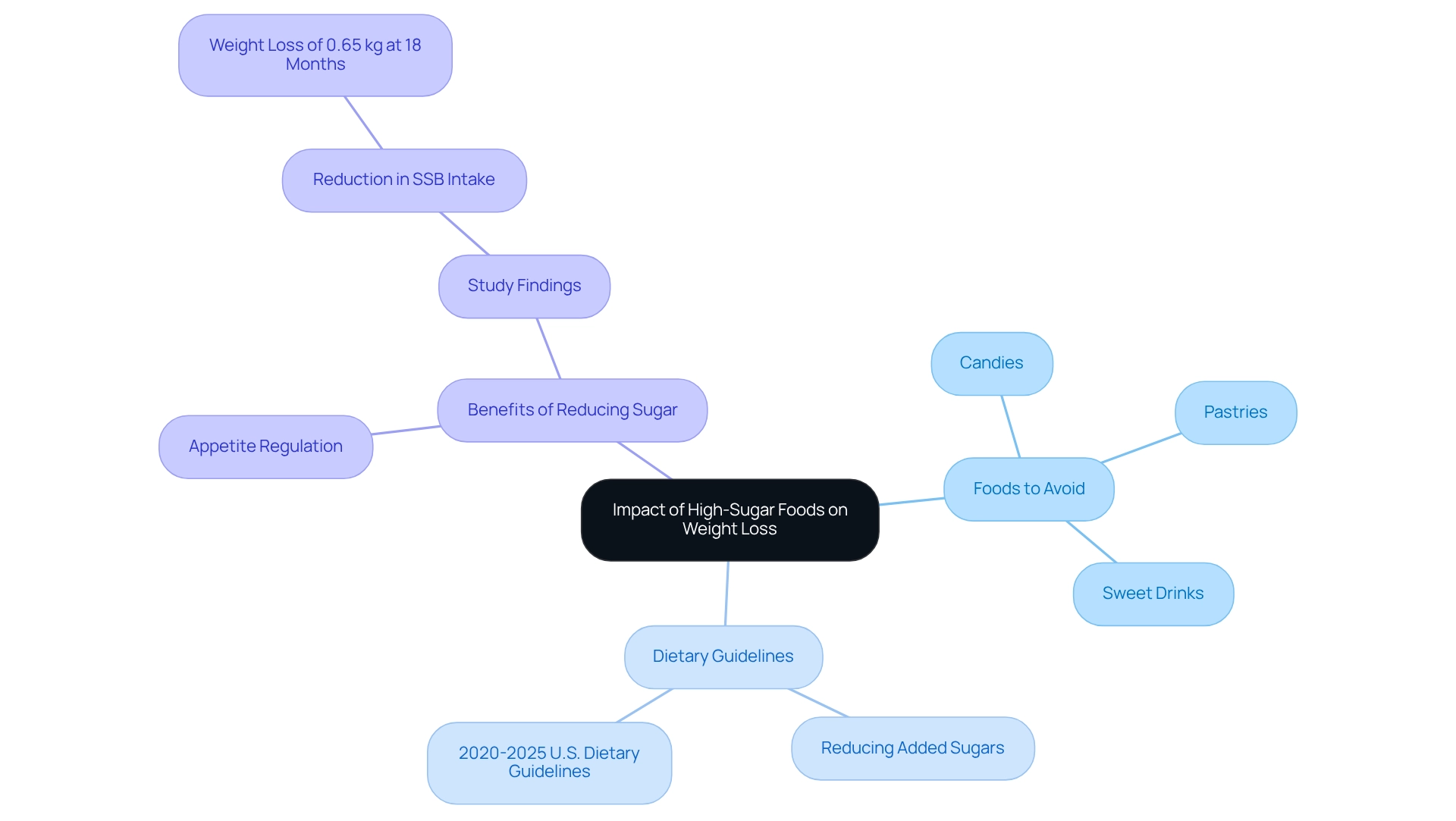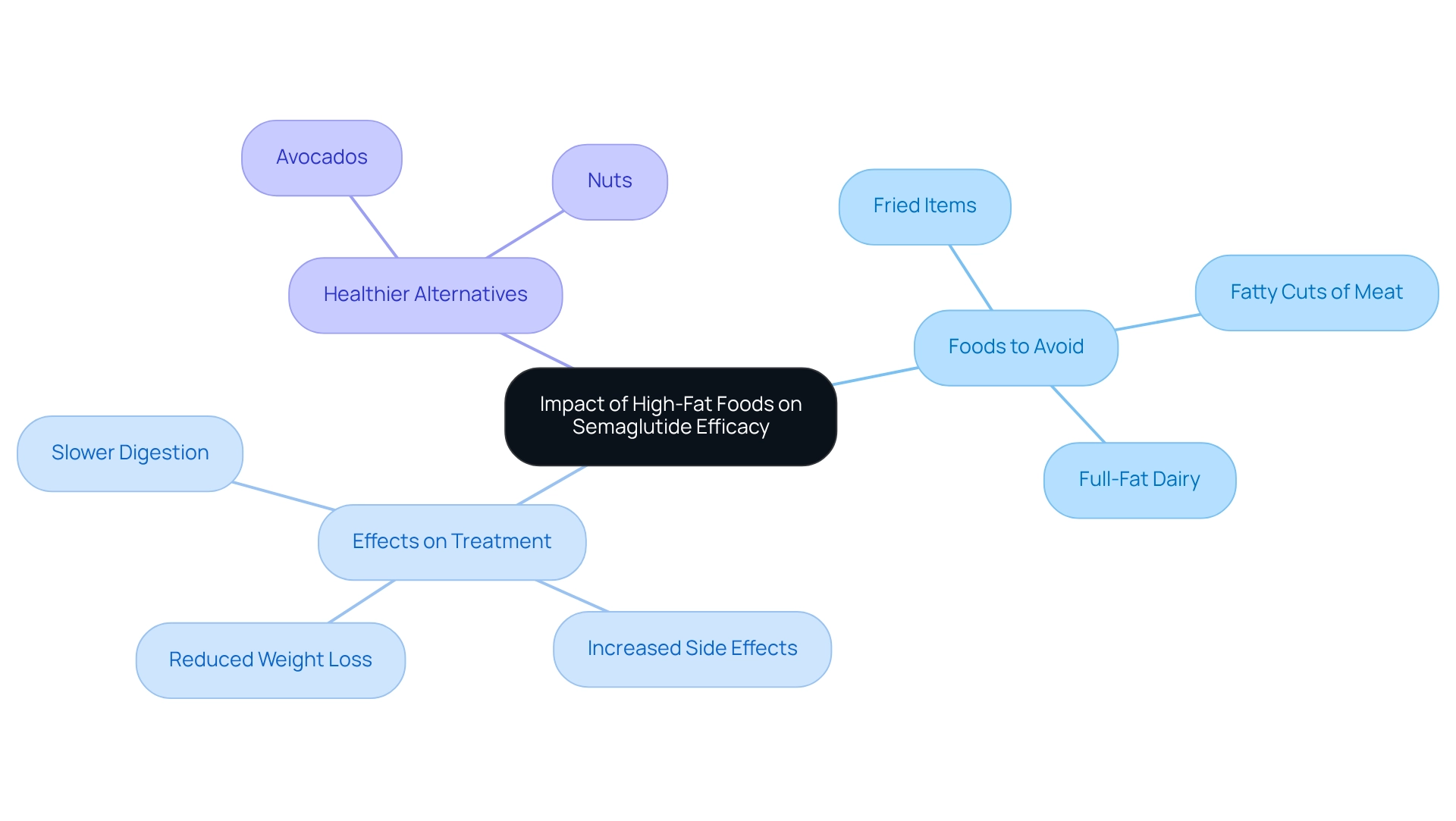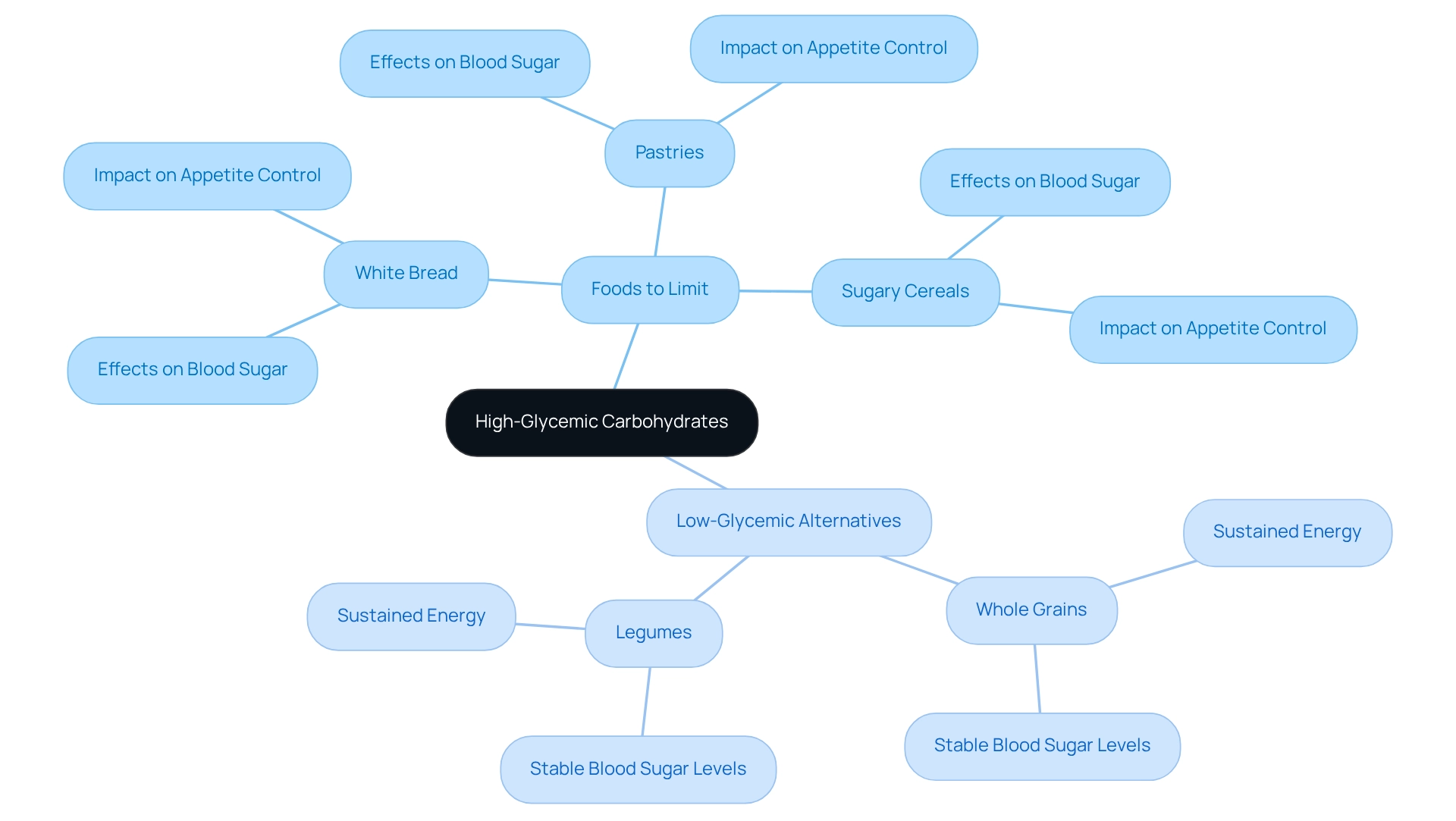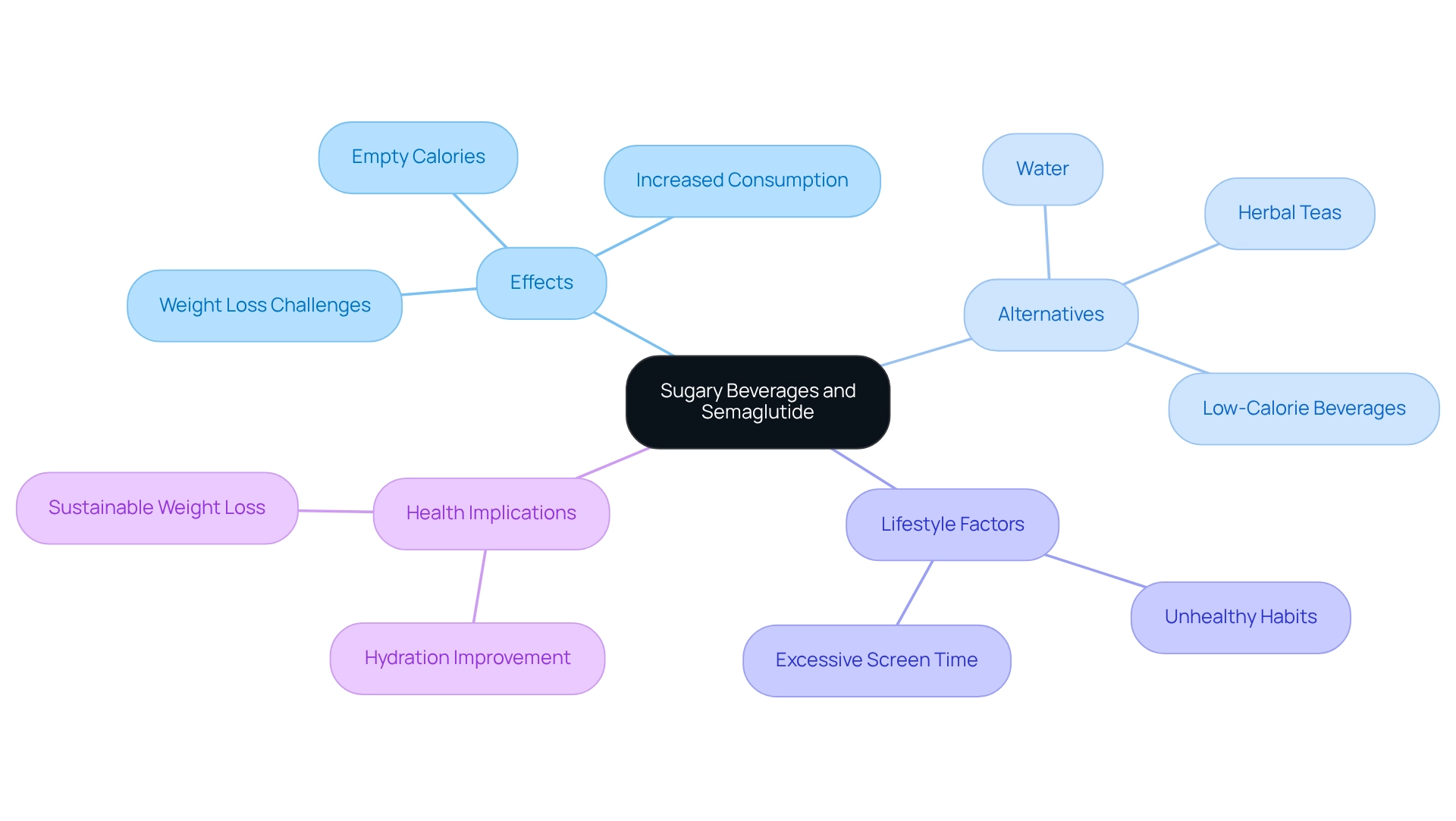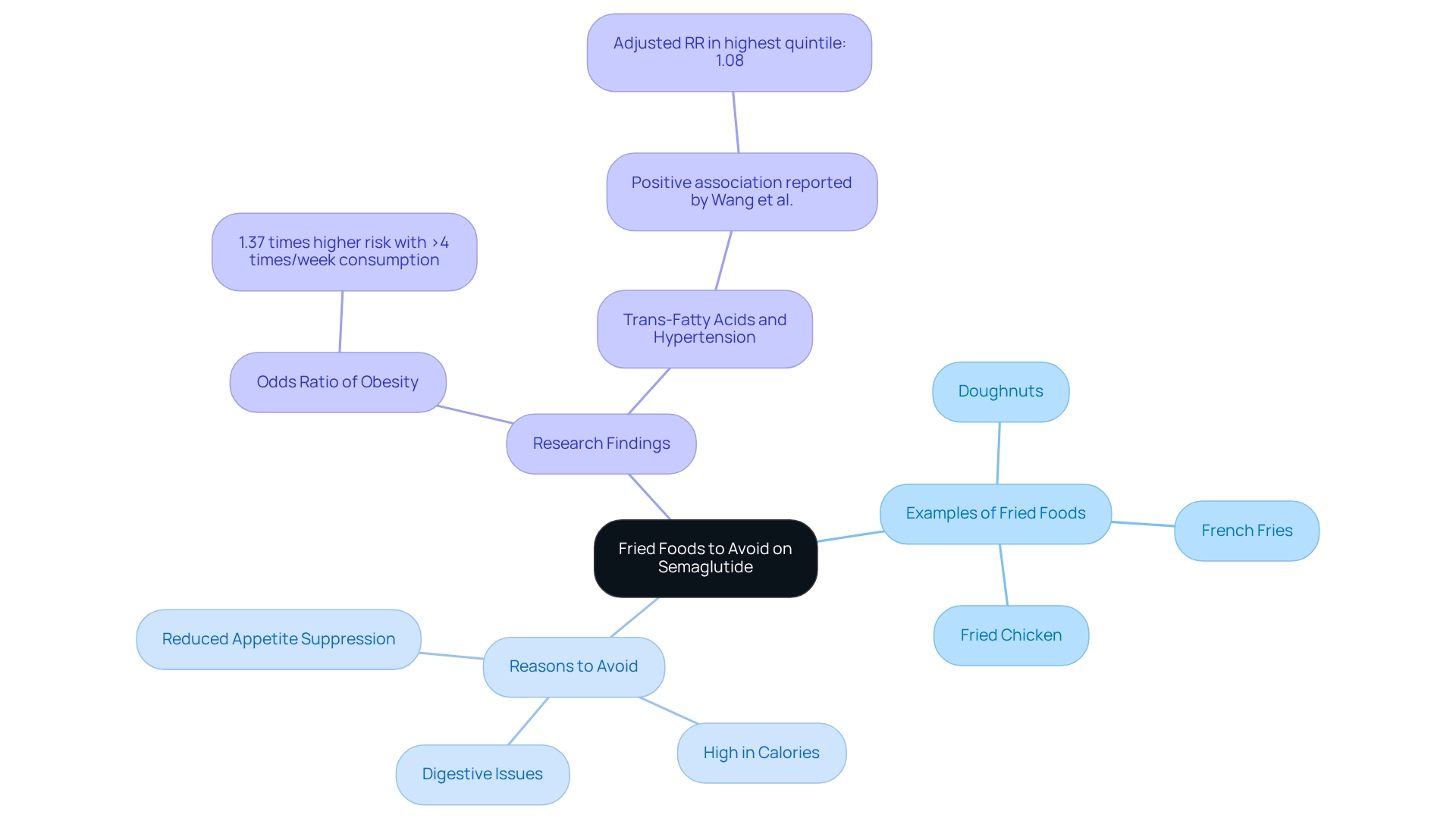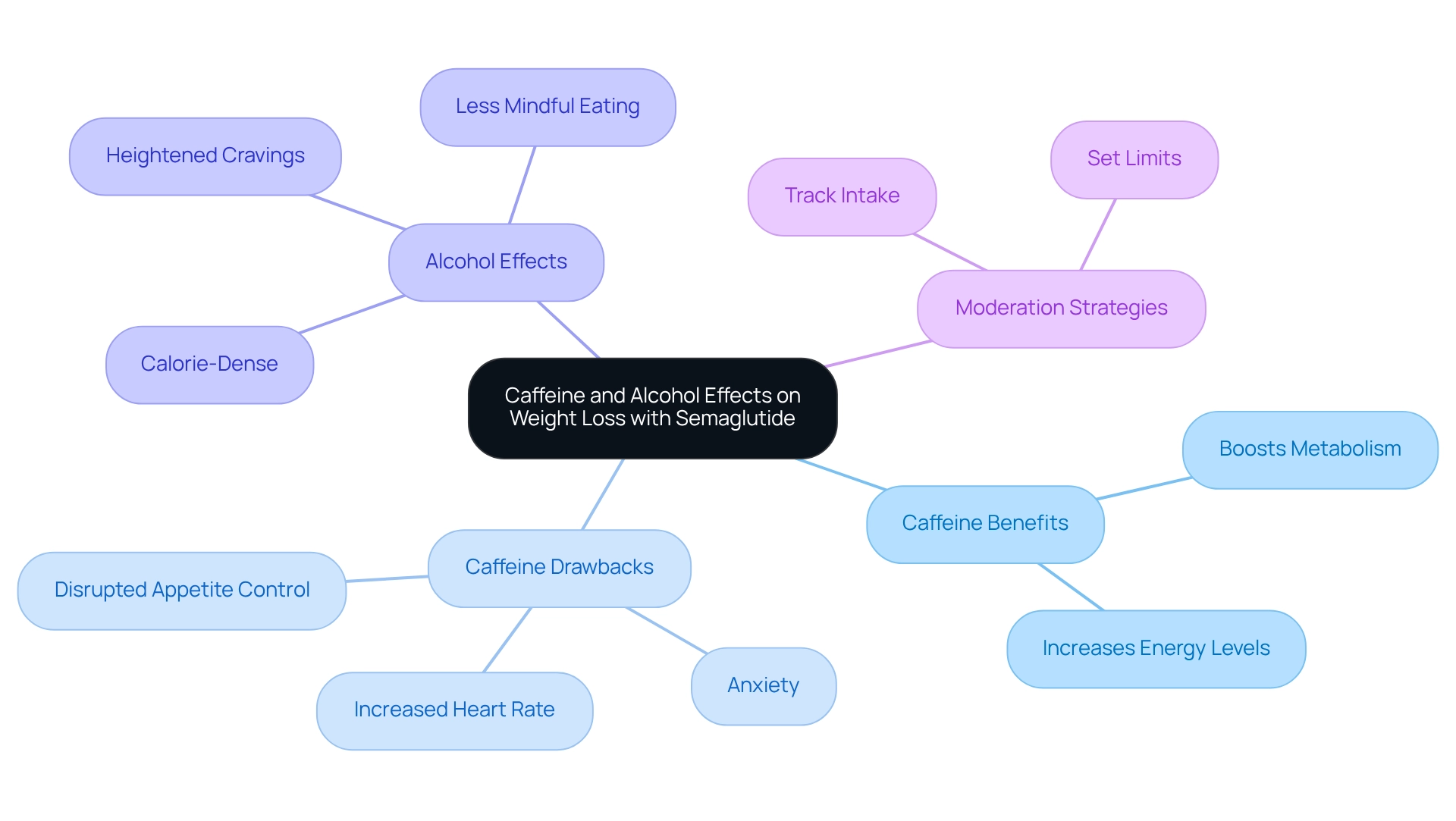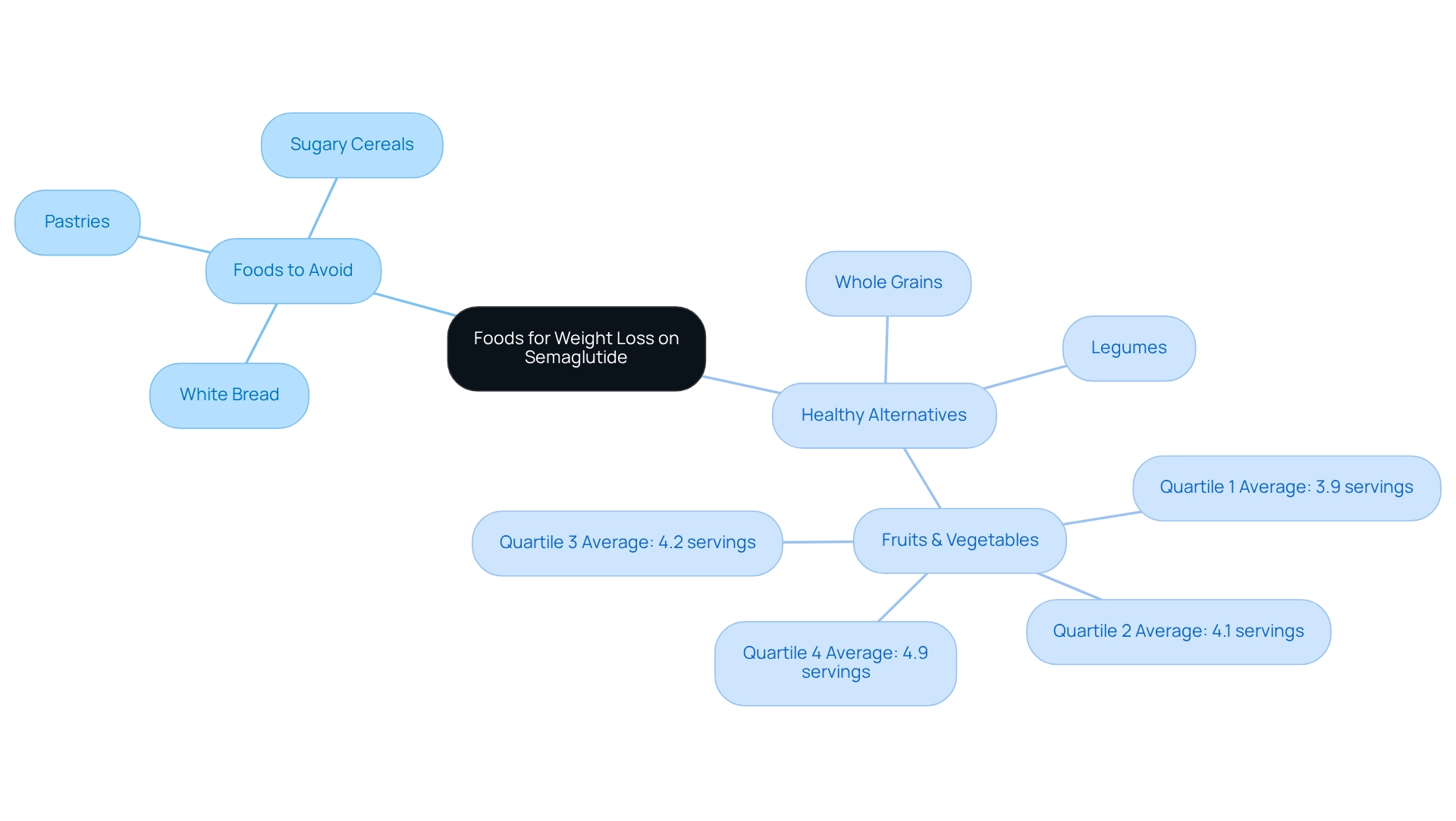Overview
If you’re on a weight loss journey with semaglutide, you may be wondering what foods to avoid to ensure your success. It’s important to understand that certain foods can hinder your progress and lead to unwanted weight gain. To help you navigate this, we recommend steering clear of:
- High-sugar foods
- Processed items
- High-fat options
- High-glycemic carbohydrates
- Sugary beverages
- Fried foods
- Caffeine
- Alcohol
- Refined carbohydrates
These choices can cause spikes in hunger and blood sugar levels, making your journey more challenging.
We know this can feel overwhelming, but remember, you’re not alone in this. By making mindful food choices, you can support the effectiveness of your medication and enhance your weight loss efforts. Together, we can achieve your goals. Take small steps and focus on nourishing your body with healthier options. You have the strength to make these changes, and we’re here for you every step of the way.
Introduction
In the quest for effective weight loss solutions, the integration of semaglutide with personalized dietary strategies has emerged as a transformative approach. As you navigate your health journey, understanding the impact of various food choices becomes crucial. Have you ever considered how high-sugar snacks or processed foods might influence your progress? The dietary landscape can significantly affect the efficacy of semaglutide, a medication designed to aid in weight management.
This article delves into essential dietary considerations that semaglutide users should be aware of. Mindful eating, avoiding certain food categories, and tailored nutritional guidance can enhance your weight loss outcomes. By embracing a holistic approach, you can not only optimize the benefits of semaglutide but also foster sustainable health habits that lead to long-term wellness. Remember, together, we can achieve your goals and create a healthier future.
Minimal: Personalized Weight Loss Solutions for Semaglutide Users
At Minimal, we understand that the journey toward personal reduction can feel overwhelming, especially for those using specific medications. That’s why we offer a strong selection of tailored solutions designed just for you. By combining medical expertise with lifestyle modifications, we provide the support you need to align with your unique health objectives.
Our comprehensive approach not only enhances the effectiveness of semaglutide but also empowers you to embrace sustainable lifestyle changes that promote long-term health and wellness. Regular check-ins with our healthcare providers play a crucial role in keeping you on track, allowing for timely adjustments to your plan to ensure optimal outcomes. Have you ever wondered how customized programs can significantly improve success rates in reducing body mass? Health experts emphasize that they are particularly beneficial for individuals with coexisting conditions.
In fact, studies show that achieving a loss of 10-15% can lead to substantial health benefits, highlighting the importance of effective management strategies. It’s reassuring to note that hypoglycemia was documented in merely 0.6% of individuals in the treatment group, and the occurrence of benign and malignant tumors was comparable between the treatment and placebo groups, addressing common safety concerns.
As Dr. Henrik Gudbergsen points out, the reduced maximum dosage creates a greater need for patients to fully commit to supportive lifestyle modifications throughout the program. This commitment can help you shed pounds and maintain your progress. As we look ahead to 2025, the integration of specific medications with tailored lifestyle modifications continues to be a prominent trend, underscoring the significance of a holistic approach to wellness.
Are you ready to kickstart your health journey? With Minimal’s personalized support and comprehensive care, we’re here for you every step of the way. For more information or to get started, please reach out to us at [email protected].
High-Sugar Foods: Why They Hinder Weight Loss on Semaglutide
If you’re navigating the challenges of weight loss, you may find that the foods to avoid on semaglutide, particularly high-sugar items like candies, pastries, and sweet drinks, can significantly hinder your efforts while on this medication. The foods to avoid on semaglutide can cause rapid spikes in blood sugar levels, often leading to increased hunger and cravings shortly after consumption. This cycle can complicate the medication’s role in appetite control, making it less effective in helping you achieve your body mass goals if you don’t consider the foods to avoid on semaglutide.
At Minimal, we understand how overwhelming this journey can feel. Our nutritionists emphasize the importance of following the 2020–2025 U.S. Dietary Guidelines, which recommend reducing added sugars. This simple change can greatly enhance the efficacy of your medication. In fact, findings from the PREMIER trial show that cutting back on sugar-sweetened beverage (SSB) consumption by just one serving a day is linked to a reduction of 0.65 kg over 18 months. This highlights the significance of being mindful about your food choices, particularly the foods to avoid on semaglutide, as reducing your sugar intake is crucial to truly enhance its benefits.
By doing so, you can improve appetite regulation and achieve more sustainable results in managing your body mass. At Minimal, we take a holistic approach that combines tailored nutrition advice with body reduction prescriptions, fitness training, and breathwork. Together, we can help you not only manage your figure effectively but also cultivate enduring health practices that support your well-being.
Remember, you’re not alone on this journey. We’re here for you, and together, we can achieve your goals.
Processed Foods: Avoid for Better Results with Semaglutide
Processed items, such as quick cuisine, packaged snacks, and ready-to-eat meals, are often laden with unhealthy fats, sugars, and excessive sodium. These ingredients are considered foods to avoid on semaglutide, as they not only contribute to weight gain but can also reduce the effectiveness of the medication in achieving your weight loss goals. A systematic review emphasized a strong link between the intake of ultra-processed items and obesity, particularly in children, which raises concerns for adults too, especially those utilizing the medication.
Have you ever noticed how elevated salt levels in processed items can lead to overeating? Research indicates that greater salt consumption correlates with higher energy intake. Kevin D. Hall, Ph.D., observed that despite variations in energy consumption and body mass between ultra-processed and unprocessed diets, glucose tolerance assessments showed no notable differences. This implies that processed items may adversely affect metabolic health, highlighting the importance of recognizing foods to avoid on semaglutide and prioritizing whole, minimally processed options rich in nutrients.
These items not only aid in reducing body mass but also assist in alleviating nutritional deficiencies frequently associated with processed diets. Experts stress that avoiding certain foods, known as foods to avoid on semaglutide, while following a diet centered on whole ingredients can improve the efficacy of semaglutide, resulting in more sustainable reductions in body mass. By steering clear of processed items, you can optimize your reduction potential and enhance your general well-being.
Consider incorporating simple whole meal options, such as a mixed vegetable stir-fry or a fresh fruit salad, as an excellent way to start making healthier dietary choices.
Furthermore, Minimal provides customized strategies for reducing body mass that can assist you in implementing these dietary adjustments efficiently. With health solutions starting as low as $49 for the first month, pursuing a healthier lifestyle is both accessible and affordable. Together, we can achieve your goals and create a path toward a healthier you.
High-Fat Foods: Their Impact on Semaglutide Efficacy
Foods to avoid on semaglutide include high-fat options, particularly those rich in saturated and trans fats, which can significantly impede its effectiveness. They tend to slow digestion and intensify gastrointestinal side effects. Fried items, fatty cuts of meat, and full-fat dairy products are considered foods to avoid on semaglutide, as they can cause discomfort and may reduce the medication’s effectiveness in aiding weight reduction.
On average, individuals using Ozempic or Wegovy manage to reduce 15-20% of their mass within a year, and many find they can sustain this reduction over time. However, recent findings from a study conducted between January 1, 2020, and December 31, 2023, reveal that those consuming high-fat diets, which are among the foods to avoid on semaglutide, may experience less favorable outcomes with this medication. This highlights the important connection between dietary fat intake and treatment efficacy, suggesting that the foods to avoid on semaglutide include high-fat options, while promoting healthier fat choices like avocados and nuts. These choices can support your overall wellness without undermining the effectiveness of the drug.
Additionally, programs designed for users of the medication increasingly emphasize the significance of managing dietary fat, particularly highlighting the foods to avoid on semaglutide. They showcase strategies that align with the medication’s action to enhance weight loss outcomes. Understanding the behavioral mechanisms behind anti-obesity medications, as discussed in the article ‘Future Directions in Obesity Treatment Research,’ reinforces the need for effective dietary strategies.
Moreover, the Control of Eating Questionnaire indicates that control of eating improves after GLP-1 analog treatment, underscoring the importance of mindful eating practices. It’s essential to recognize that variations in treatment regimens and concomitant medications among participants may influence observed outcomes. This highlights the necessity for personalized dietary strategies tailored to your unique needs. Additionally, gut microbiome testing and intervention can enhance digestion and energy levels, making it a vital factor for those using the medication. Remember, together, we can achieve your goals, and we’re here for you every step of the way.
High-Glycemic Carbohydrates: Foods to Limit on Semaglutide
High-glycemic carbohydrates, such as white bread, pastries, and sugary cereals, can lead to rapid spikes in blood sugar levels. If you’re taking this medication, these fluctuations might increase your hunger and cravings, making it harder to benefit from the drug’s appetite-suppressing advantages. At Minimal, we understand how crucial it is to control blood sugar levels for successful body reduction. That’s why we recommend opting for low-glycemic alternatives like whole grains and legumes. These choices not only provide sustained energy but also help maintain stable blood sugar levels, which is essential for appetite control.
Recent studies have shed light on the importance of the glycemic index in appetite regulation. They suggest that diets low in high-glycemic foods can enhance the effectiveness of semaglutide. For instance, participants in controlled studies, such as the GLYNDIET study, experienced better weight loss outcomes when following low-glycemic diets. This emphasizes how important your dietary choices are alongside medication. The study also established strict participant criteria to ensure reliable results, adding credibility to these findings.
Nutrition specialists emphasize that the foods to avoid on semaglutide, particularly high-glycemic carbohydrates, can significantly influence your body composition management strategies. As Angeliki Papadaki pointed out, “The impacts of protein and glycemic index on variations in body mass that we discovered in the shop centers were in alignment with those at the instruction centers.” By focusing on foods to avoid on semaglutide that hinder stable blood sugar levels, you can enhance the benefits of semaglutide, leading to a more successful and sustainable journey toward a healthier body.
At Minimal, we’re here for you. Our comprehensive approach combines personalized nutrition advice, including dietitian consultations and ongoing glucose monitoring, with body transformation prescriptions. Together, we can embrace lasting health habits. Future studies should involve larger sample sizes and more intensive interventions to accurately assess the effects of low-GI diets. This will further enhance our understanding of this important area. Moreover, the support from organizations like the National Heart Foundation of Australia and Meat and Livestock Australia highlights the significance of low-glycemic diets in effectively managing body mass.
Sugary Beverages: A Major Obstacle for Semaglutide Users
Sugary drinks, including sodas, sweetened teas, and energy beverages, are considered foods to avoid on semaglutide as they are significant sources of empty calories that can hinder weight loss efforts. These beverages contribute to excessive caloric intake while providing little to no satiety, which can lead to increased food consumption. Have you noticed that adults and teenagers who engage in unhealthy habits, like excessive screen time, tend to reach for sugary drinks more often? This pattern complicates the journey to manage body mass, highlighting the importance of addressing lifestyle factors in the pursuit of successful reduction.
To enhance fat reduction, it’s essential for semaglutide users to be aware of the foods to avoid on semaglutide, such as sugary drinks, and consider substituting them with healthier options like water, herbal teas, or other low-calorie beverages. Making this shift not only helps reduce caloric intake but also promotes better hydration and overall health. Health experts emphasize that the caloric impact of sugary drinks can be quite significant, making it crucial to include these considerations in any reduction strategy. As Benjamin Franklin wisely stated, “The best doctor gives the least medicine,” reminding us of the importance of our dietary choices over solely relying on medication.
By eliminating these high-calorie drinks and being aware of the foods to avoid on semaglutide, users can truly enhance their weight loss journey and improve their chances of achieving sustainable results. Deborah N., a verified buyer, shared her experience with Minimal, stating, “Love my axiofit fit tope,” which beautifully illustrates how making healthier beverage choices can positively influence one’s wellness journey. Furthermore, with health solutions starting as low as $49 for the first month, Minimal offers accessible support for those looking to make healthier beverage choices. Together, we can achieve your goals and foster a healthier lifestyle.
Fried Foods: Why They Should Be Avoided on Semaglutide
Fried items, such as beloved french fries, crispy fried chicken, and indulgent doughnuts, fall under the foods to avoid on semaglutide as they can pose significant challenges for those using this medication. Foods to avoid on semaglutide are not only high in calories but can also lead to digestive issues that may worsen gastrointestinal side effects like nausea and bloating. Have you ever noticed how the elevated fat content in fried foods can diminish the appetite-suppressing effects of your treatment? This can make it even tougher to meet your weight loss goals.
Research indicates that individuals who consume fried items more than four times a week have a 1.37 times higher adjusted odds ratio for becoming overweight or obese compared to those who indulge less frequently. This statistic highlights the importance of making mindful dietary choices, including knowing the foods to avoid on semaglutide. Additionally, a report titled ‘Research Gaps in Fried Cuisine Studies’ emphasizes the need for more extensive research to understand the health impacts of fried food consumption, particularly regarding body management.
Furthermore, a study by Wang et al. found a positive correlation between the intake of trans-fatty acids and the risk of hypertension, shedding light on the broader health risks associated with fried foods. Therefore, steering clear of fried items can significantly enhance your comfort and improve your chances of successfully reducing body mass. Remember, we’re here for you, and together, we can achieve your goals!
Caffeine and Alcohol: Their Effects on Weight Loss with Semaglutide
When using semaglutide, it is crucial to be aware of the foods to avoid on semaglutide, such as caffeine and alcohol, as they can significantly impact individuals. Moderate caffeine consumption may actually boost metabolism and energy levels, providing a helpful advantage. However, when taken in excess, caffeine can lead to an increased heart rate and anxiety, which might disrupt appetite control and hinder efforts to reduce body mass. Research indicates that while high caffeine intake can be linked to maintaining body composition, moderation is key to avoiding negative side effects.
On the other hand, alcohol is calorie-dense, containing around 7 calories per gram. This can quickly accumulate, leading to unwise dietary choices. Studies suggest that individuals who regularly consume alcohol may struggle to adhere to their dieting strategies, often experiencing heightened cravings and less mindful eating. For those using semaglutide, it’s essential to be aware of the foods to avoid on semaglutide, including limiting alcohol intake, to achieve the best possible outcomes.
At Minimal, we believe in a holistic approach to managing body mass, integrating personalized reduction solutions with comprehensive care. Recent studies underscore the importance of being mindful about both caffeine and alcohol consumption. For instance, a case study from the German Control Registry revealed that successful weight maintainers engaged in more frequent self-weighing and had increased eating frequencies, yet they also reported binge eating and compensatory behaviors. This complexity highlights the importance of closely monitoring eating patterns, including caffeine and alcohol intake.
Health professionals at Minimal recognize that a balanced approach to caffeine, alcohol, and foods to avoid on semaglutide can enhance the effectiveness of the medication. Dr. Chance Miller shares, “Clients appreciate the personalized attention from a dedicated care team, which includes physicians like myself, who emphasize transformative care.” By moderating these substances, users can align their habits with their reduction goals, paving the way for more sustainable outcomes.
To effectively manage the caloric impact of alcohol, consider tracking your intake and setting limits on consumption. At Minimal, our effective weight loss plans often include strategies for managing caffeine and alcohol consumption, ensuring that clients can enjoy their lifestyles while still progressing towards their health goals. Furthermore, the study listed on ClinicalTrials.gov (NCT03693430) contributes to understanding the effectiveness of semaglutide in managing body mass, highlighting the significance of these dietary factors.
Refined Carbohydrates: Foods to Avoid for Effective Weight Loss on Semaglutide
Foods to avoid on semaglutide include refined carbohydrates such as white bread, pastries, and sugary cereals, which can present significant challenges for users. Have you ever noticed how these foods lead to rapid spikes in blood sugar levels? This can result in heightened hunger and cravings, which may undermine the effectiveness of your medication. Research indicates that diets high in processed carbohydrates are linked to obesity and difficulties in managing body mass, highlighting the importance of making mindful eating choices.
On the other hand, incorporating whole grains and fiber-rich foods is essential for maintaining stable blood sugar levels, which can help in reducing body mass. Nutritionists emphasize the role of fiber, as it not only aids digestion but also promotes satiety, helping to curb those pesky cravings. For instance, individuals who follow healthier diets consume significantly more fruits and vegetables—those in the top quartile average 4.9 servings daily compared to only 3.9 in the bottom quartile.
Moreover, case studies reveal a nonlinear relationship between carbohydrate consumption and obesity. This suggests that traditional dietary models may overlook crucial nuances in how refined carbs affect body management. By steering clear of refined carbohydrates and being mindful of foods to avoid on semaglutide, users can enhance their weight loss results. There are real-world examples of individuals who successfully transformed their health by prioritizing whole foods over processed options. This strategic dietary shift not only complements the effects of Semaglutide, which can lead to an average reduction of 15-20% in body mass, but also fosters a sustainable approach to long-term health, aligning with Minimal’s holistic wellness philosophy.
To implement these dietary changes, consider replacing refined carbohydrates with whole grains, legumes, and a colorful array of fruits and vegetables in your meals. This simple adjustment can significantly enhance your journey towards reducing body mass by also being aware of the foods to avoid on semaglutide. Remember, we’re here for you—Minimal’s tailored health approach integrates nutrition guidance, fitness training, and expert support to help you succeed. Together, we can achieve your goals.
Mindful Eating: Key Dietary Considerations for Semaglutide Users
Conscious eating is essential for those using this medication, as it enhances their weight loss journey by fostering a deeper connection with nourishment. This practice encourages users to tune into their hunger cues, eat slowly, and savor each bite. As a result, they make more mindful food choices and maintain appropriate portion sizes. Research indicates that mindful eating can significantly improve management results, especially for those on semaglutide, as it helps prevent overeating and promotes healthier choices.
Recent studies have shown that incorporating mindful eating strategies can lead to meaningful improvements in effectiveness for reducing body mass. For instance, mediation analysis revealed that increases in mindful eating practices positively influenced fasting glucose levels. A control group experienced a modest increase of 2.8 mg/dL, along with reduced sweets consumption among participants. This suggests that a mindful approach not only aids in weight loss but also supports overall metabolic health.
To effectively practice mindful eating while on semaglutide, consider these strategies:
- Eat without distractions: Turn off screens and focus solely on your meal to enhance your awareness of the eating experience.
- Chew thoroughly: Take the time to chew each bite, which can improve digestion and increase satisfaction.
- Pause between bites: Allow yourself to pause and assess your hunger and fullness levels throughout the meal.
- Reflect on dietary choices: Before consuming, consider how the sustenance will nourish your body and contribute to your health goals.
Many have found success in their weight loss journeys through mindful eating techniques while on this medication. Clients report significant progress, with many achieving sustainable results by integrating these practices into their daily routines. As Dr. Chance Miller notes, “Clients appreciate the personalized attention from a dedicated care team, which emphasizes transformative care.” This personalized support contributes to the high success rate of the program, enhancing client satisfaction and health outcomes. Additionally, the Transformative Care Team case study illustrates how these mindful eating strategies have led to real-world success, further highlighting the importance of this approach. Health coaches emphasize that mindful eating, along with knowledge of the foods to avoid on semaglutide, not only enhances the benefits of the medication but also fosters a healthier relationship with food, leading to long-term success in weight management. Together, we can achieve your goals!
Conclusion
Integrating semaglutide with personalized dietary strategies offers a wonderful opportunity for effective weight management. By focusing on key dietary considerations—such as minimizing high-sugar snacks, avoiding processed foods, and limiting high-fat and refined carbohydrate intake—you can enhance the efficacy of the medication. Prioritizing whole foods and mindful eating practices can lead to significant improvements in your weight loss outcomes, helping you foster sustainable health habits.
It’s essential to tailor your dietary choices to your unique needs. Research consistently shows that making informed food selections—like choosing low-glycemic carbohydrates and reducing sugary beverage consumption—can directly impact your appetite control and overall success with semaglutide. Additionally, understanding the effects of caffeine and alcohol consumption is crucial for maintaining a balanced approach to weight loss.
Ultimately, embracing a holistic strategy that combines semaglutide with personalized nutrition guidance, regular health check-ins, and mindful eating techniques can lead to lasting health improvements. As you embark on this weight loss journey, remember that focusing on sustainable lifestyle changes and informed dietary choices will pave the way for achieving and maintaining your health goals. By committing to these principles, you not only enhance the effectiveness of semaglutide but also contribute to a healthier, more fulfilling life. Together, we can achieve your goals and celebrate your progress.
Frequently Asked Questions
What does Minimal offer for individuals seeking personal reduction?
Minimal provides a strong selection of tailored solutions that combine medical expertise with lifestyle modifications to support individuals in aligning with their unique health objectives.
How does Minimal enhance the effectiveness of semaglutide?
Minimal enhances the effectiveness of semaglutide by empowering individuals to embrace sustainable lifestyle changes that promote long-term health and wellness, alongside regular check-ins with healthcare providers for timely adjustments to their plans.
Why are customized programs important for weight loss?
Customized programs significantly improve success rates in reducing body mass, especially for individuals with coexisting conditions, by providing tailored strategies that address their specific needs.
What health benefits can be achieved from a weight loss of 10-15%?
Achieving a loss of 10-15% of body mass can lead to substantial health benefits, emphasizing the importance of effective management strategies.
What safety concerns are associated with semaglutide treatment?
Safety concerns include the occurrence of hypoglycemia, which was documented in only 0.6% of individuals in the treatment group, and the occurrence of benign and malignant tumors, which was comparable between the treatment and placebo groups.
What is the significance of lifestyle modifications in the semaglutide program?
The reduced maximum dosage of semaglutide creates a greater need for patients to commit to supportive lifestyle modifications, which can help them shed pounds and maintain their progress.
What dietary changes should individuals consider while on semaglutide?
Individuals should avoid high-sugar foods, such as candies, pastries, and sweet drinks, as these can hinder weight loss efforts and complicate the medication’s role in appetite control.
What do the 2020–2025 U.S. Dietary Guidelines recommend?
The guidelines recommend reducing added sugars, which can greatly enhance the efficacy of semaglutide and improve appetite regulation.
How do processed foods affect weight loss while on semaglutide?
Processed foods, which are often high in unhealthy fats, sugars, and sodium, can contribute to weight gain and reduce the effectiveness of semaglutide in achieving weight loss goals.
What are some healthier alternatives to processed foods?
Healthier alternatives include whole meal options like mixed vegetable stir-fry or fresh fruit salad, which can aid in reducing body mass and alleviating nutritional deficiencies.
How does Minimal assist individuals in making dietary adjustments?
Minimal provides customized strategies for reducing body mass that help individuals implement dietary adjustments efficiently, making it easier to pursue a healthier lifestyle.








